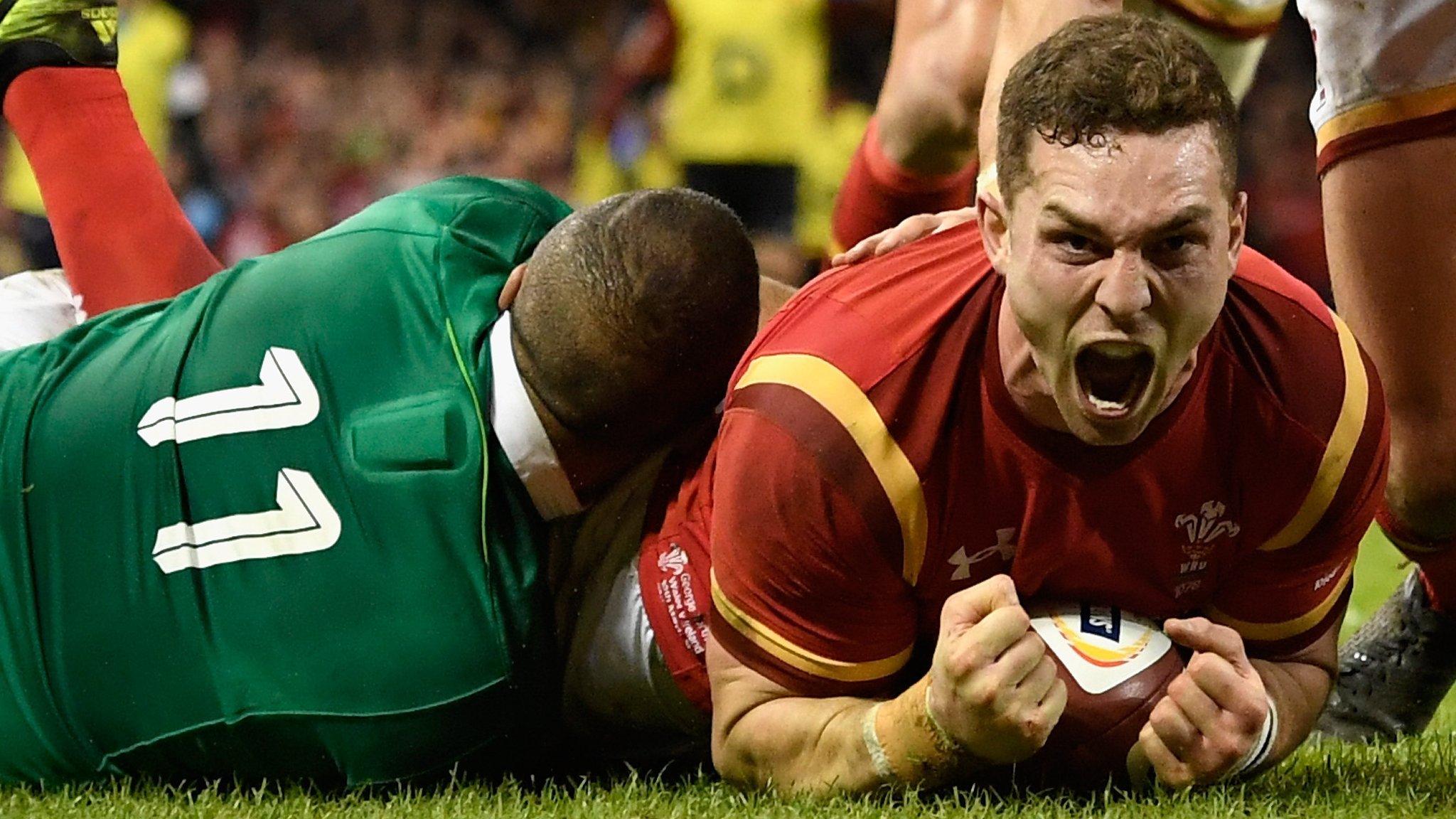Six Nations: England equal the All Blacks - but are they on their level?
- Published
- comments
Highlights: England thrash Scotland to retain Six Nations title
"We're one year into a four-year project. We've done reasonably well in the first year."
It sounds like something a college lecturer might say to a room of young undergraduates, or the owner of a small tech start-up to his three staff after filing the company's first year-end accounts.
It is not the sort of thing you expect to greet a world record-equalling victory, one that puts your team alongside arguably the greatest outfit ever to play your sport.
Somewhere under that roguish grin, England coach Eddie Jones must surely feel like skipping around the Twickenham turf, throwing in the occasional giddy cartwheel.
Since taking over, he has seen them win 17 matches in a row, storm to their first Grand Slam in 13 years, complete a series whitewash in his native Australia and secure back-to-back Six Nations titles, with another Slam shot to come against Ireland in Dublin on Saturday.
It is success beyond imagining, not least for a team that had just been knocked out of the World Cup they were hosting a mere three games in. Allied to the dead-rubber win over Uruguay at the fag-end of that sorry month, it means England, with their 61-21 hammering of Scotland on Saturday, have now equalled New Zealand's tier-one record of 18 Test wins on the spin.
For Jones, history is not enough. Seven tries against Scotland, three of them the sort of high-speed deception and sleight of hand that wins over the unconverted and makes weary old cynics purr, and he spoke almost entirely of the next challenge against Ireland.
"This game has given us the opportunity to play well in that game," he said on Saturday, the noise from partying England supporters echoing around just outside. "It's all about what we do next."
He is probably right, as he has been through so much of his reign. Should England lose to Ireland, the record is unlikely to offer consolation to his players or their travelling support. When those same players step away from the game and assess the impact they made upon it, it is the trophies and medals they will cherish above the statistics.
"It means the players would have achieved greatness," said Jones about the prospect of a second successive Grand Slam, something that has never been done in the Six Nations and only four times in the Five Nations that preceded it. "And how often in your life do you get the chance to achieve greatness?"
It takes something for Jones to use a word as emotive as that, and he immediately qualified it. "We want to be number one team and we're not, so we need to do better."
This may have been a record points tally in the Calcutta Cup and matched the mark for the biggest margin of victory in this oldest of internationals, but it came against a Scotland side who only played when they had already handed the match away.
Had you told Scotland coach Vern Cotter in advance that his side would score three converted tries, he might have dared dream that his penultimate game in charge might see that horrible 34-year winless streak at Twickenham come to a beautiful end.
Instead, with three players lost to head injuries, the replacement for one of them carried off the field and his scrum-half forced to play most of the contest on the wing, he saw misfortune married to ineptitude, his team outwitted in defence and unable to unleash their attacking potential until it no longer mattered.
"We've been trying to move away from being plucky losers," said skipper John Barclay, "but that wasn't plucky today. That was useless."
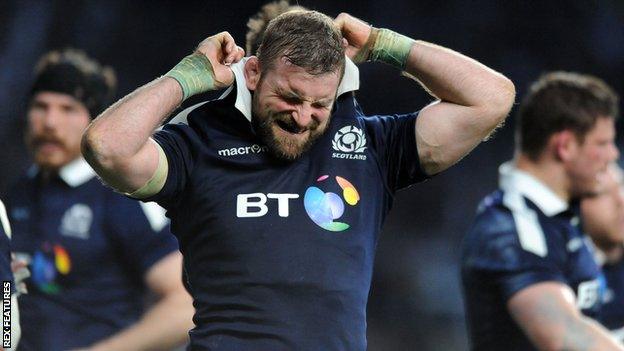
John Barclay took over the Scotland captaincy from the injured Greig Laidlaw in their third game against Wales
And so it still feels surreal to compare this England team to an All Blacks side that won a third World Cup eight games into their own run, whose march included 41-13 and 57-15 wins over the Springboks, the latter away from home, as well as a 62-13 victory against France and five over Australia.
Before this week, England felt like a good team with a great record, rather than a great team or a team of greats.
The World Cup-winning All Blacks side contained arguably the two finest ever in their positions, fly-half Dan Carter and flanker Richie McCaw, as well as other superstars in Ma'a Nonu and Conrad Smith. They were the first team in history to retain the Webb Ellis trophy, like the Brazil side that won football's World Cup in 1970 at a sanctified level, taking their sport to heights that none before had touched.
When McCaw and Carter stepped away, the team continued to develop rather than atrophy. The XV that set the original 18-match mark with the 37-10 Bledisloe Cup win over the Wallabies contained eight players who would make most critics' fantasy world team: Ben Smith, Julian Savea, Beauden Barrett, Dane Coles, Brodie Retallick, Sam Whitelock, Jerome Kaino and Kieran Read.
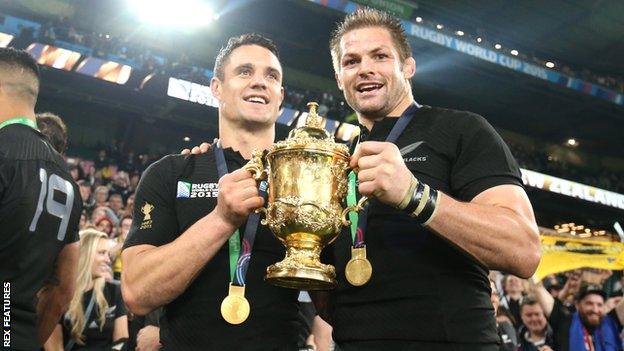
All-time greats Richie McCaw and Dan Carter retired following the All Blacks' 34-17 victory over Australia to win the 2015 Rugby World Cup
And so there is a gap, even if Billy Vunipola is fast becoming a totemic figure, even as Owen Farrell continues to raise his standards - 26 points on Saturday, 11 successful kicks from 12, his only miss a penalty from inside his own half - even as England's power and pace off the bench continue to flatten tired northern hemisphere defences.
"We're not the number one team," Jones said flatly. "Look at the rankings. There's a gap between us and number one. We aspire to being number one."
Yet the aspiration no longer seems impossible, as it did in that warm autumn of 2015, when a gulf existed between New Zealand and England that seemed unbridgeable. If England were to end this four-year project with a World Cup of their own, only then do you sense Jones will be truly satisfied.
England's record-equalling run (October 2015-present) | |
|---|---|
WIN 1: 60-3 v Uruguay (h) | WIN 10: 44-40 v Australia (a) |
WIN 2: 15-9 v Scotland (a) | WIN 11: 37-21 v South Africa (h) |
WIN 3: 40-9 v Italy (a) | WIN 12: 58-15 v Fiji (h) |
WIN 4: 21-10 v Ireland (h) | WIN 13: 27-14 v Argentina (h) |
WIN 5: 25-21 v Wales (h) | WIN 14: 37-21 v Australia (h) |
WIN 6: 31-21 v France (a) | WIN 15: 19-16 v France (h) |
WIN 7: 27-13 v Wales (h) | WIN 16: 21-16 v Wales (a) |
WIN 8: 39-28 v Australia (a) | WIN 17: 36-15 v Italy (h) |
WIN 9: 23-7 v Australia (a) | WIN 18: 61-21 v Scotland (h) |
New Zealand's record-equalling run (ended by Ireland in November 2016) | |
|---|---|
WIN 1: 41-13 v Australia (h) | WIN 10: 36-22 v Wales (h) |
WIN 2: 26-16 v Argentina (n) | WIN 11: 46-6 v Wales (h) |
WIN 3: 58-14 v Namibia (n) | WIN 12: 42-8 v Australia (a) |
WIN 4: 43-10 v Georgia (n) | WIN 13: 29-9 v Australia (h) |
WIN 5: 47-9 v Tonga (n) | WIN 14: 57-22 v Argentina (h) |
WIN 6: 62-13 v France (n) | WIN 15: 41-13 v South Africa (h) |
WIN 7: 20-18 v South Africa (n) | WIN 16: 36-17 v Argentina (a) |
WIN 8: 34-17 v Australia (a) | WIN 17: 57-15 v South Africa (a) |
WIN 9: 39-21 v Wales (h) | WIN 18: 37-10 v Australia (h) |
- Published12 March 2017
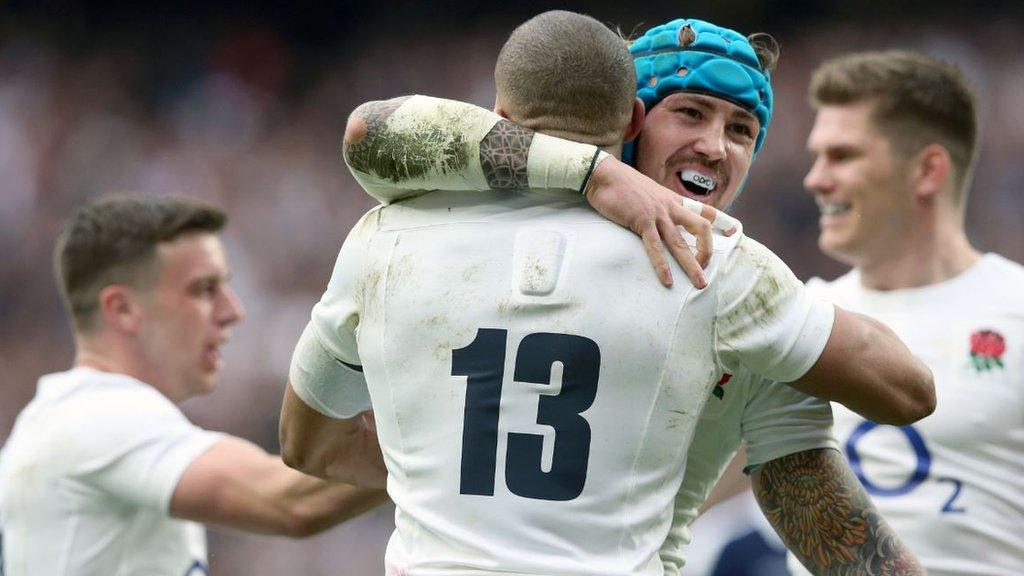
- Published11 March 2017
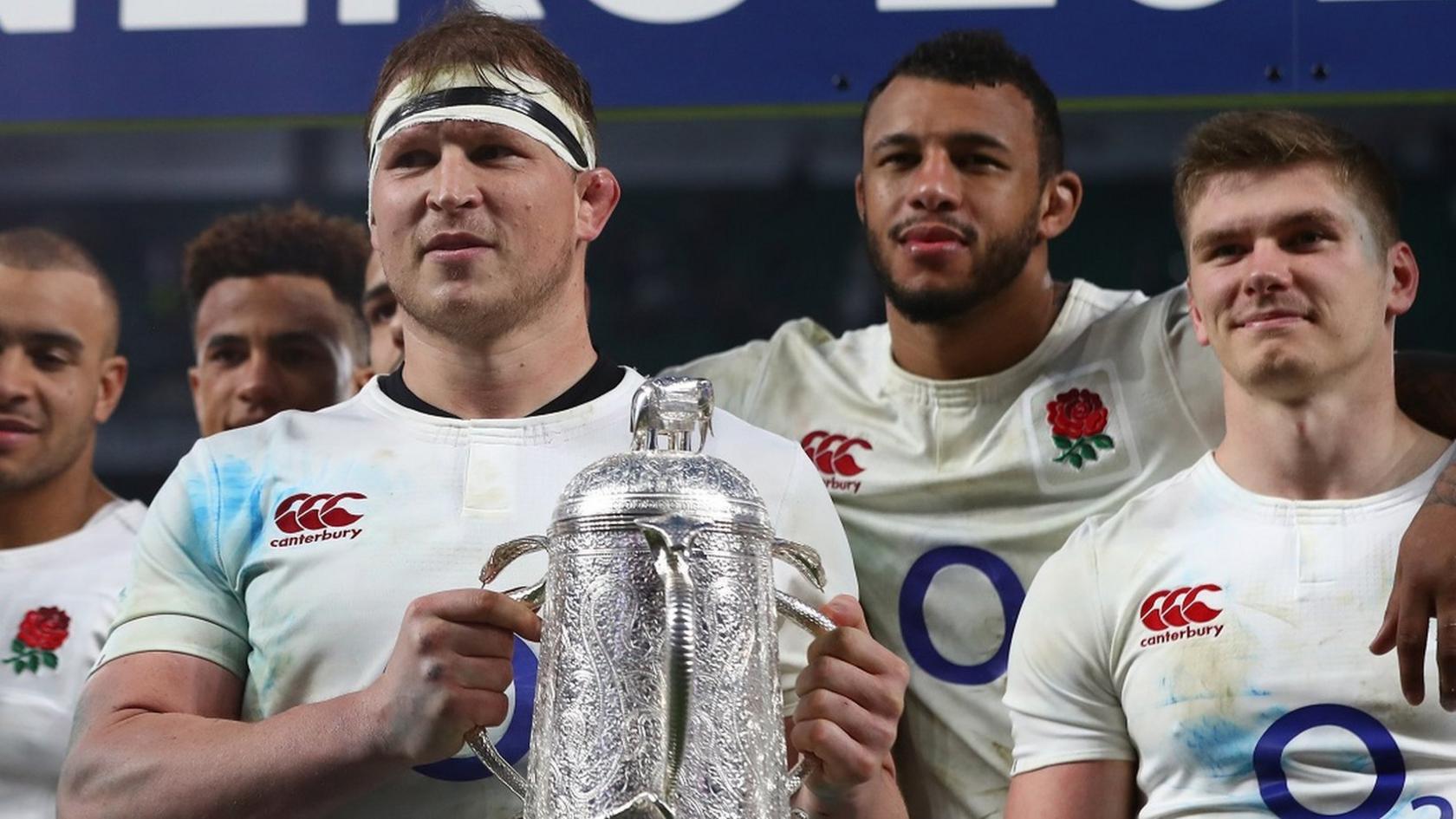
- Published11 March 2017
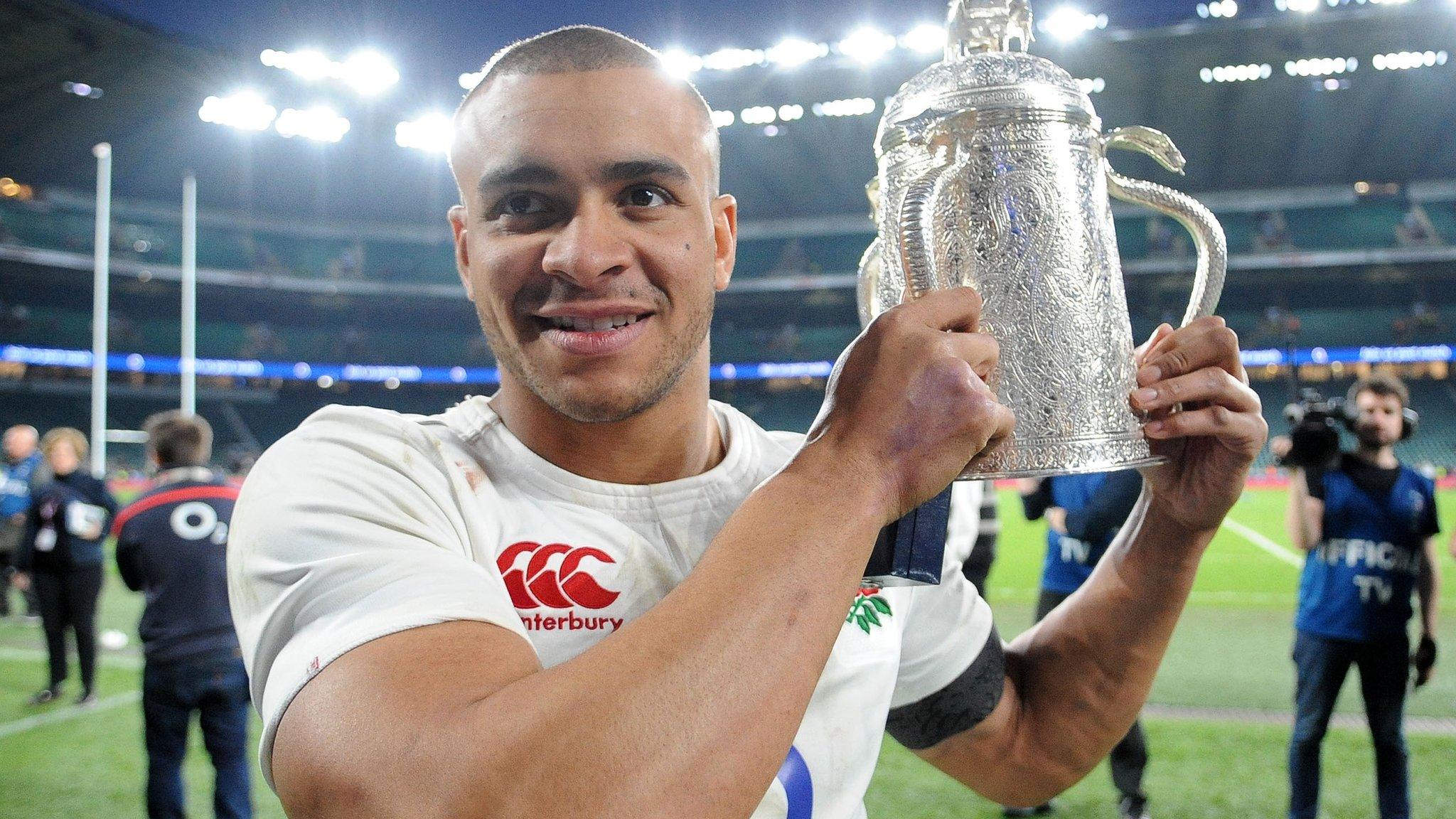
- Published11 March 2017
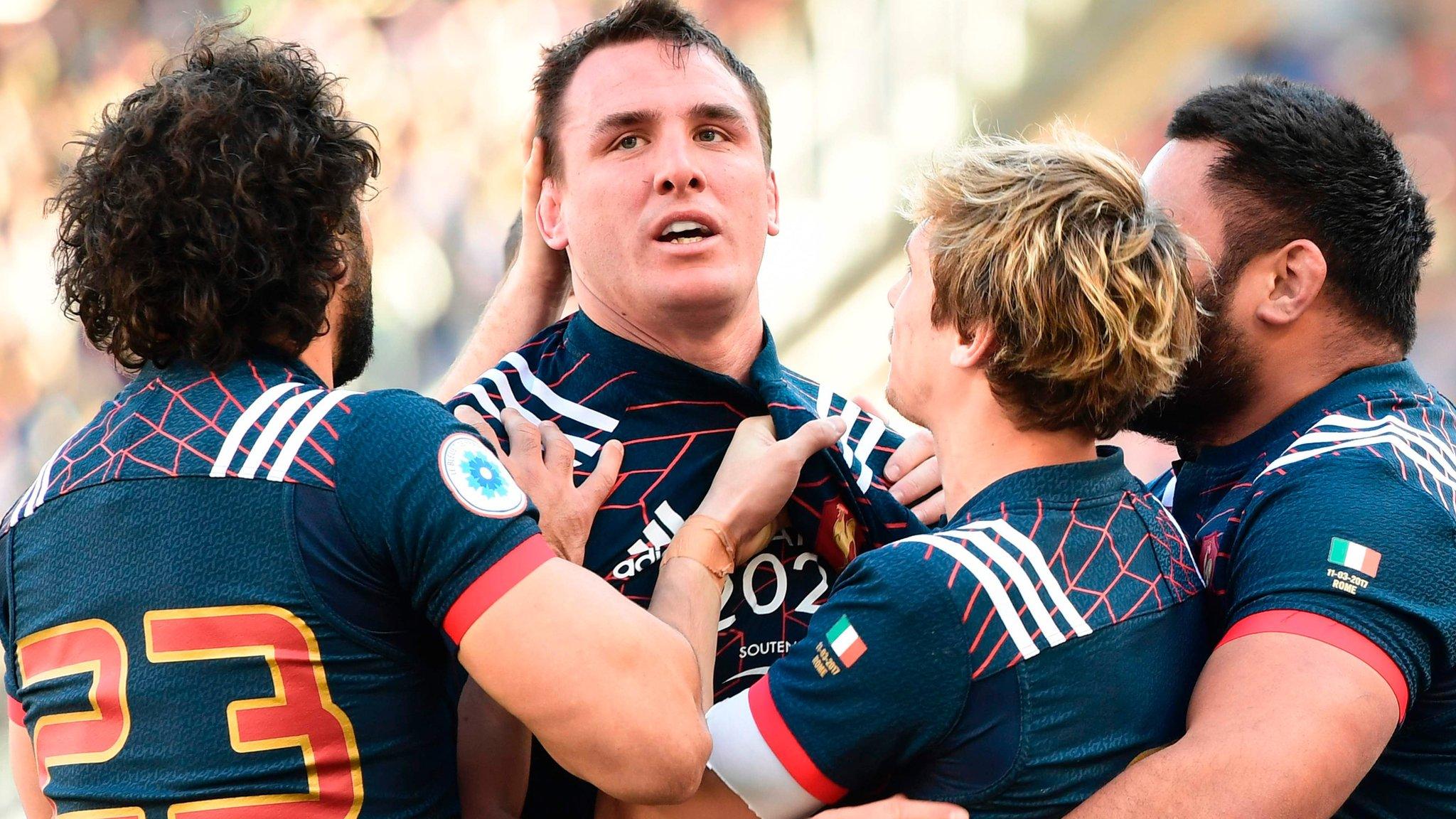
- Published11 March 2017
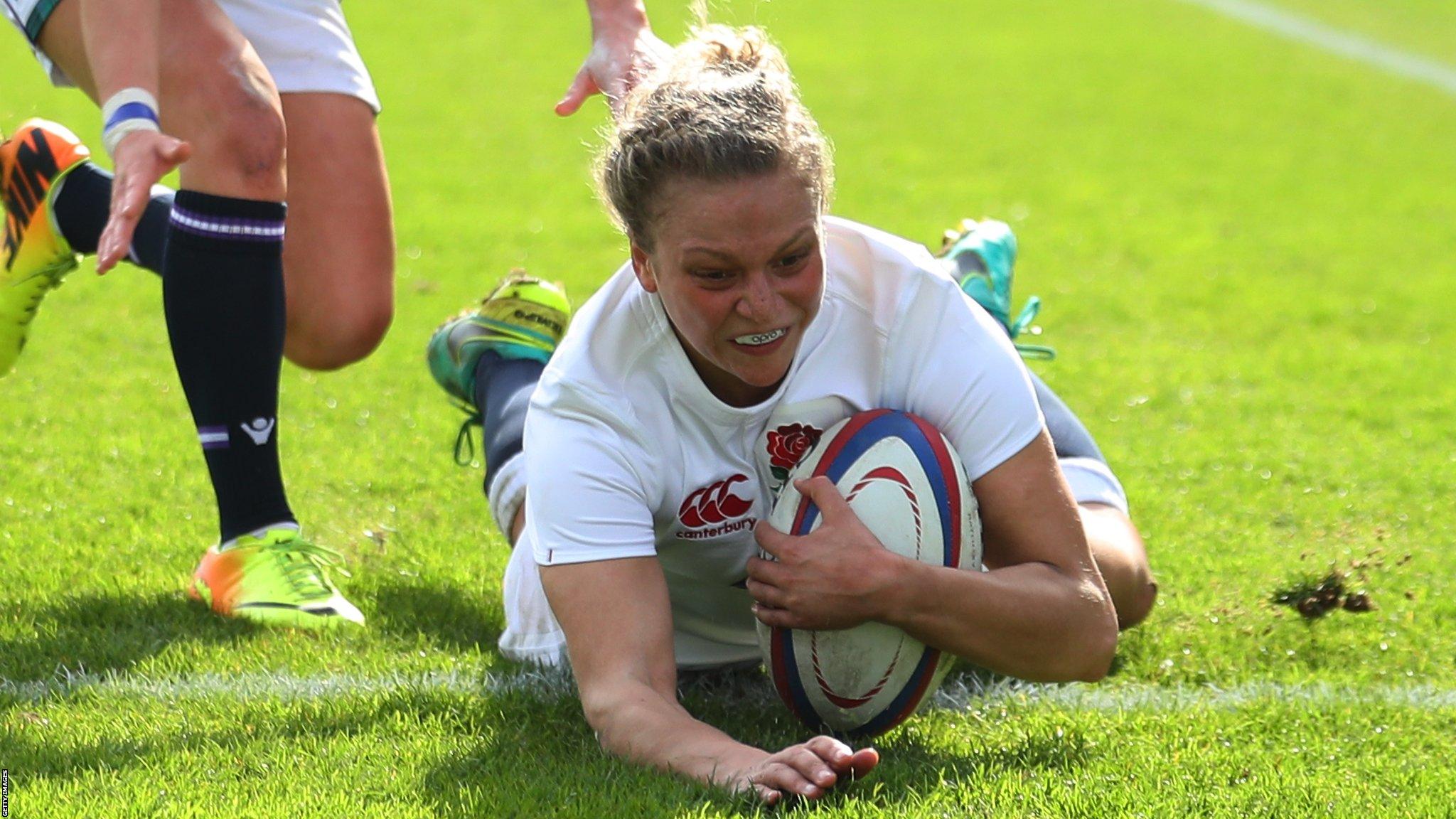
- Published10 March 2017
